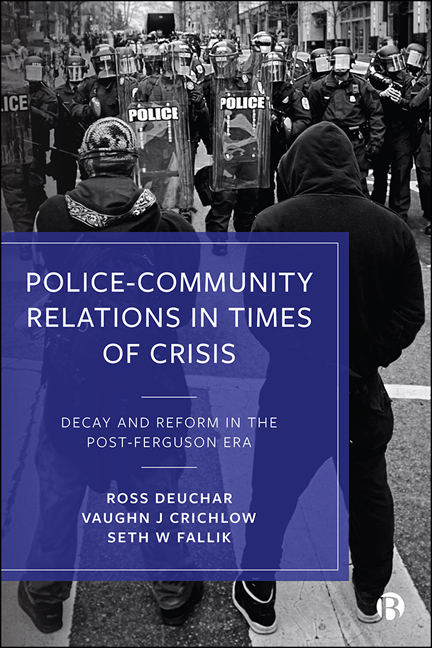8 - Future Perspectives on Police–Community Relations
Published online by Cambridge University Press: 21 December 2021
Summary
Findings from fieldwork conducted with police, non-law enforcement practitioners, and justice-involved young men were presented throughout the previous chapters. We explored contemporary police–community relations and discussed the historical roots of racial conflict and social decay in America. Scholarly perspectives on policing and anti-gang strategies were also discussed, and challenges related to the policing of young men in disadvantaged communities were highlighted. In this concluding chapter, we summarize findings based on ethnographic research in a Southern American state and address the implications of navigating a post-Ferguson era largely characterized by divisiveness and acrimony. We note emerging issues regarding the policing of racial and ethnic minorities and suggest approaches to foster more procedurally just practices and improve police legitimacy perceptions. In addition, we reflect on lessons learned from previous police-reform efforts and provide recommendations for police–community reforms in troubled times.
Navigating the impossible mandate
Commentators have characterized the unique challenges of police work as “the impossible mandate,” or mission impossible, due to unrealistic public expectations (Manning, 1977; Goldsmith, 2005; Roelofse, 2010). In contexts where resources are scarce and personnel are stretched, police are expected to be effective at enforcing the law, maintaining order, and keeping crime at bay, while also garnering trust and partnering with communities. During times of crisis and social change, such wishes are even more difficult to fulfill, and given the lessons of the last hundred years it is not surprising that police often fall short of lofty ideals. For example, between the 1920s and 1940s, despite concerns about police brutality and civil rights abuses, there was an emphasis on managerial efficiency and adherence to the bidding of lawmakers (Walker & Katz, 2017); however, this was soon followed by significant developments related to the civil rights movement, as social upheaval and racial conflict took center stage. This ushered in a wave of civil and human rights campaigns comprising organized groups of racial minorities, political activists, civil libertarians, LGBTQI community members, and bohemians.
Civil rights campaigns were also launched in response to police abuses and government overreach, and they forced municipalities to reconsider the relationship between oppressed minorities and the State (Agee, 2017).
- Type
- Chapter
- Information
- Police-Community Relations in Times of CrisisDecay and Reform in the Post-Ferguson Era, pp. 155 - 168Publisher: Bristol University PressPrint publication year: 2021

